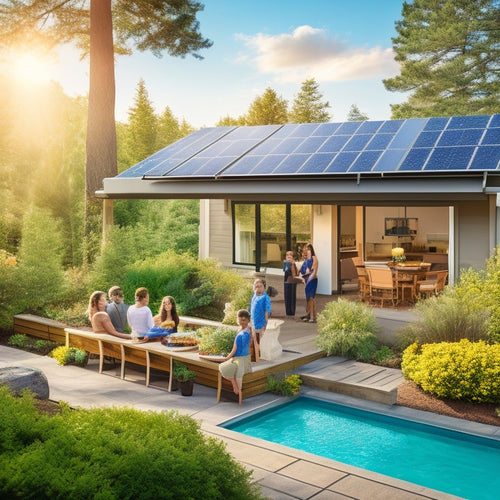
Solar for Your Home
Share
By investing in a customized solar panel system for your home, you can eliminate electricity costs, reduce your carbon footprint, and potentially drop your energy bills to zero. You'll gain energy independence, generate your own renewable energy, and enjoy backup power during outages. Plus, solar panels can increase your property value by up to $15,000 or more, making them a smart investment. With the average cost of solar panels decreasing, now's the time to investigate how solar energy can benefit your home, its resale value, and the environment - and uncover the many perks that come with utilizing the power of the sun.
The Essentials
- Installing solar panels can eliminate electricity costs and reduce carbon footprint, providing energy independence and cost savings.
- Solar power systems can increase property value by up to $15,000 or more, making them a smart investment for homeowners.
- Solar panels convert sunlight into electricity through photovoltaic cells, generating electrical current for home power needs.
- Proper roof orientation, direction, and shading analysis are crucial for optimal solar panel performance and energy output.
- Solar energy adoption reduces reliance on fossil fuels, decreasing greenhouse gas emissions and contributing to climate change mitigation.
Zero Energy Bills Possible
You can achieve energy independence and eliminate your electricity costs with a solar panel system that's customized to your home's energy needs.
By generating your own electricity, you'll no longer rely on the grid, and your energy bills will drop to zero.
With solar power, you'll enjoy the benefits of renewable energy solutions that not only reduce your carbon footprint but also provide backup power during outages and emergencies.
You'll enjoy the benefits of zero-cost electricity and a significant reduction in your carbon footprint.
Energy Independence Achieved
With solar panels on your roof, your home can break free from the grid, achieving energy independence and potentially eliminating your energy bills altogether. This means you'll have more control over your energy consumption and production, relying less on public utilities.
By utilizing the power of the sun, you'll be generating your own clean energy, reducing your carbon footprint, and contributing to a more sustainable future.
With off-grid electrical systems, you can enjoy backup power during outages and remote power access, ensuring your home remains powered even when the grid is down.
Off-grid solutions, powered by smart technology, enable you to store excess energy generated during the day for use at night or during periods of low sunlight. This allows you to maintain a stable and consistent energy supply, unaffected by grid outages or rate hikes.
With energy independence, you'll enjoy the freedom to live life on your own terms, without being tied to the grid. You'll also experience a sense of security, knowing that your energy needs are met, regardless of external factors.
Zero Cost Electricity
Achieving energy independence is just the beginning. You're now on the path to zero cost electricity, where you can say goodbye to energy bills. With a solar panel system, you can generate your own electricity and offset your energy consumption.
By integrating solar panels, a charge controller, inverter, and battery storage into a single, compact unit, you can experience a streamlined, plug-and-play solution All in One Solar Power System. This setup guarantees a steady power supply even when the grid is down, and markedly reduces your reliance on costly utility bills.
To maximize your savings, take advantage of solar incentives like tax credits, which can greatly reduce your installation costs. Additionally, consider financing options that fit your budget, and investigate local regulations that encourage renewable energy adoption.
Proper maintenance is essential to guarantee your system operates at peak levels. Follow maintenance tips to keep your panels clean and functioning efficiently.
With a grid connection, you can sell excess energy back to the grid and offset your energy storage needs. System monitoring allows you to track your energy production and consumption in real-time, providing useful observations to enhance your energy usage.
As you enjoy the environmental benefits of solar energy, you'll also appreciate the financial freedom that comes with zero energy bills. By going solar, you're not only reducing your carbon footprint but also securing a cleaner, more sustainable future for generations to come.
Increases Property Value Fast
By installing solar panels, you'll not only reduce your energy bills but also enhance your property's value quickly.
In fact, with the average cost of single solar panels for homes decreasing, it's becoming a more accessible and affordable option for many homeowners residential solar panel prices.
This improvement to your home equity can be substantial, and when you decide to sell, you'll likely see a significant increase in your sales price.
In fact, studies have shown that solar panels can increase your home's value by up to $15,000 or more, making them a smart investment for homeowners like you.
Boosts Home Equity Fast
Your investment in solar energy can greatly enhance your home's equity fast, increasing its resale value in the process. By installing solar panels, you're not only reducing your carbon footprint but also making a smart financial move.
This eco-friendly improvement can elevate your property value, making your home more attractive to potential buyers in the future. According to market trends, homes with solar panels sell faster and for more money than those without.
You'll also reap the benefits of financial incentives, such as tax credits and rebates, which can offset the initial cost of installation. As a homeowner, you'll enjoy significant energy savings, which can lead to increased satisfaction and a sense of freedom from reliance on the grid.
Increases Sales Price
Solar panels greatly enhance your home's resale value, and this increase in property value directly correlates to a higher sales price. In fact, studies have shown that solar panels can increase your property value by up to $15,000 or more, depending on the location and size of the system. This rise in value is largely due to the long-term savings that solar panels provide, which are highly attractive to potential buyers.
As you consider installing solar panels, it's crucial to keep an eye on market trends and take advantage of solar incentives. With the cost of solar panels decreasing over the years, now is an excellent time to invest in this technology.
Additionally, many governments offer incentives, such as tax credits, to encourage homeowners to switch to renewable energy sources. By doing so, you'll not only increase your property value but also contribute to a more sustainable future.
Panels Convert Sunlight to Electricity
You'll want to understand how solar panels convert sunlight into electricity to power your home.
This process begins when sunlight hits the photovoltaic (PV) cells in the panels, exciting the electrons and generating an electrical current.
In addition, deep cycle batteries off grid solar systems play an essential role in storing excess energy for later use.
As the current flows through an inverter, it's converted into usable electricity, ready to power your appliances and lighting.
Energy From Sunlight
Most homes receive an abundance of sunlight throughout the day, making it possible to employ this energy to power your daily needs. By exploiting sunlight benefits through solar technology, you can reduce your reliance on traditional energy sources and enjoy the freedom that comes with generating your own power.
Solar panels convert sunlight into electrical energy, which can be used to power appliances, lights, and even heating and cooling systems. This clean and renewable energy source offers numerous advantages, including lower energy bills and a reduced carbon footprint.
As you consider shifting to solar power, it's important to understand the benefits of sunlight energy and how it can be utilized to meet your unique needs.
With advancements in solar technology, it's now more efficient and cost-effective than ever to tap into the energy potential of sunlight. By installing solar panels on your home, you'll be taking a significant step towards energy independence and reducing your impact on the environment.
Electricity Generation Process
Electricity Generation Process
Several photovoltaic (PV) cells make up a solar panel, and each one is designed to convert sunlight into electrical energy. You'll find that these cells are made from semiconducting materials, which release electrons when exposed to sunlight. As the electrons flow, they create an electrical current. This process is the core of solar technology, allowing you to capture energy from the sun and power your home.
The PV cells are arranged in a grid-like pattern on the surface of the solar panel, maximizing energy efficiency. When you install a photovoltaic system, it's connected to your electrical panel, allowing you to tap into the renewable resources of sunlight.
With grid connectivity, you can even sell excess energy back to the grid and take advantage of solar incentives. The installation process is relatively straightforward, and maintenance requirements are minimal.
As you look to the future, you can feel confident that your investment in solar technology will pave the way for sustainable living and future innovations in energy efficiency.
Assess Your Roof's Orientation
You'll want to assess your roof's orientation to guarantee optimal solar panel performance, which is a vital aspect of residential solar power systems with integrated energy storage solutions.
Efficient energy storage solutions, such as the Tesla Powerwall, can further enhance the benefits of solar power smart energy storage.
The direction your roof faces affects the amount of sunlight your panels receive, with south-facing roofs typically receiving the most.
Shading from trees, buildings, or other obstructions can also impact performance, so it's important to evaluate these factors when determining the best placement for your solar panels.
Roof Direction Matters
Several factors contribute to the effectiveness of a solar panel system, and one essential aspect is your roof's orientation. When considering solar panel placement, the direction your roof faces plays a significant role in determining the system's energy output.
Ideally, a south-facing roof receives the most sunlight throughout the day, making it the best direction for solar panels. However, if your roof doesn't face directly south, don't worry – solar panels can still generate power from eastern or western orientations, albeit with slightly reduced efficiency.
Best roof angles also impact energy production. A roof with an angle between 15 and 45 degrees is typically considered ideal for solar panels, as it allows snow to slide off easily and provides a sturdy surface for the panels.
Avoid installing solar panels on flat roofs, as they're more prone to snow accumulation and debris buildup. By evaluating your roof's orientation and angle, you can determine the most suitable placement for your solar panels, maximizing their energy output and your savings.
Shading Effects Performance
One essential consideration when evaluating your roof's orientation for solar panels is the impact of shading on their performance. Shading can greatly reduce the energy output of your solar panel system, making it vital to assess the shading effects on your roof.
To do this, a shading analysis is necessary. This involves evaluating the shadows cast by surrounding objects, such as trees, buildings, and even your own roof's features, like vents and skylights.
A thorough shading analysis will identify areas of your roof that receive the most sunlight throughout the day and year, ensuring the best placement of your solar panels.
Shading optimization is also important to maximize energy production. This involves strategically positioning your solar panels to minimize shading effects.
By doing so, you can increase the overall efficiency of your solar panel system, generating more electricity and reducing your reliance on the grid.
Low Carbon Footprint Guaranteed
By installing solar panels, you'll greatly reduce your energy consumption, which is an essential step in minimizing your carbon footprint.
This reduction is achieved by generating clean energy from the sun, thereby decreasing your reliance on fossil fuels.
As a result, you'll lower your greenhouse gas emissions and contribute less to climate change.
Reduce Energy Consumption
Reduce Energy Consumption
About 30% of your home's energy is wasted on inefficient lighting, appliances, and heating systems. By reducing energy consumption, you'll not only lower your utility bills but also contribute to a cleaner environment.
Start by replacing traditional incandescent bulbs with energy-efficient LED or CFL bulbs, which use considerably less power. Next, upgrade to energy-efficient appliances, such as those with the ENERGY STAR label, which meet strict energy efficiency guidelines set by the U.S. Environmental Protection Agency.
Additionally, consider investing in smart home technology, which allows you to control and monitor your energy usage remotely. This can help you identify areas of inefficiency and make adjustments to optimize your energy consumption.
You can also install occupancy sensors, timers, and programmable thermostats to optimize your energy usage. By taking these steps, you'll be well on your way to reducing your energy consumption and enjoying the benefits of a low-carbon footprint.
Frequently Asked Questions
Can I Install Solar Panels on a Rented Property?
You'll need to review your lease agreements and understand your tenant rights before installing solar panels on a rented property, as you'll need the landlord's permission and may be responsible for removing the system when you move out.
How Long Does a Typical Solar Panel Installation Take?
As you commence this modern-day odyssey, you'll find that a typical residential solar installation timeline unfolds like a well-oiled machine, taking around 3-5 days for installation, and 1-3 months for permits and inspections, freeing you from the grid's shackles.
Are Solar Panels Resistant to Extreme Weather Conditions?
You'll be relieved to know that solar panels are built to withstand extreme weather conditions, boasting impressive durability and resilience in the face of harsh elements, ensuring your investment remains intact and efficient.
Can I Add More Panels to My Existing Solar System?
As you pave your path to energy independence, you're wondering if you can add more panels to your existing system. The answer is yes, as long as you confirm panel compatibility, allowing seamless system expansion to further utilize the power of the sun.
Do Solar Panels Require Regular Maintenance and Cleaning?
You'll want to clean your solar panels regularly to guarantee peak energy output; cleaning frequency depends on your location, but maintenance tips suggest inspecting and cleaning every 6-12 months to remove dirt and debris.
Final Thoughts
You've made it this far, and yet, you're still paying for electricity? It's ironic, isn't it? With solar panels, you could be generating your own power and enjoying zero energy bills. Instead, you're sending your hard-earned cash to the utility company. Don't let that continue. Make the switch to solar and reap the benefits: increased property value, low carbon footprint, and the satisfaction of being energy-independent. What are you waiting for?
Related Posts
-

Top Eco-Friendly Camping Equipment for a Sustainable Adventure
When you're camping with the planet in mind, opt for eco-friendly gear like tents made from recycled materials and bi...
-

Is This the Future of Alternative Energy Systems
Yes, alternative energy systems are shaping the future of energy. Innovations in solar and wind technologies are driv...
-

Top-Rated Home Solar Power Kits for Achieving Energy Independence
Top-rated home solar power kits enable you to achieve energy independence by greatly cutting your energy costs. You c...


